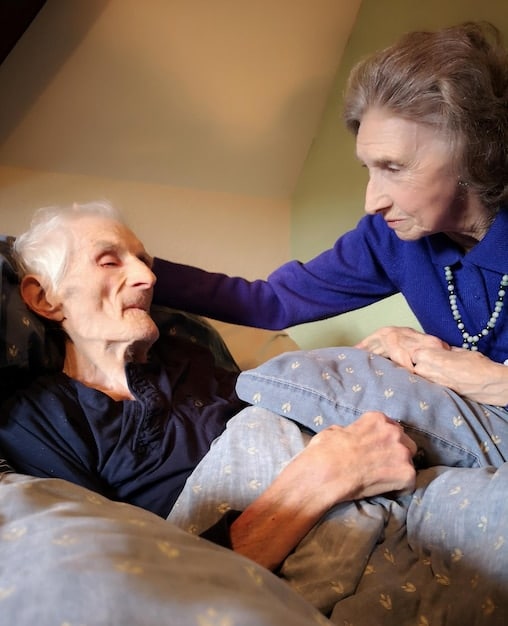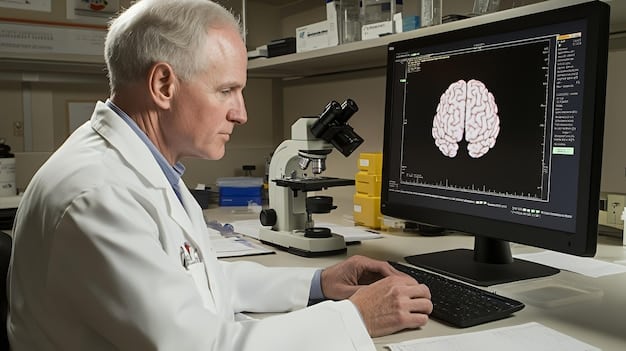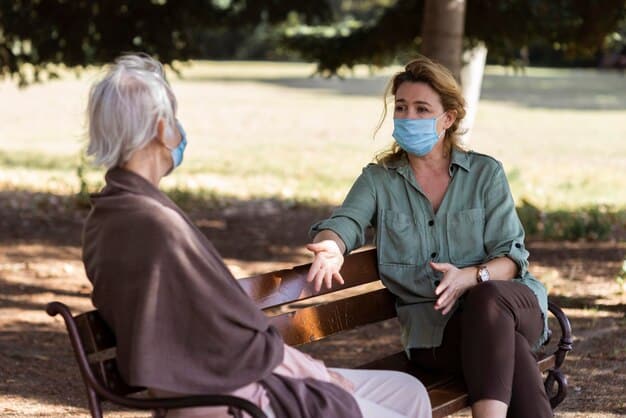The Latest on Alzheimer’s Care: Research, Treatments, and Caregiver Support

The latest research on Alzheimer’s care focuses on developing new treatments to slow disease progression and effective support strategies for caregivers, addressing both patient well-being and caregiver burden.
Discover the latest research on Alzheimer’s care, exploring innovative treatments and crucial support strategies that can significantly improve the lives of both patients and their dedicated caregivers.
Understanding Alzheimer’s Disease: A Quick Overview
Alzheimer’s disease is a progressive neurodegenerative disease that gradually impairs memory, thinking skills, and eventually, the ability to carry out simple tasks. Understanding the fundamentals of this disease is the first step in navigating its complexities.
While there’s currently no cure, ongoing research is continually shaping our understanding and approach to managing Alzheimer’s.
Key Symptoms and Progression
Early symptoms often include difficulty remembering recent events or conversations. As the disease progresses, symptoms worsen and can include:
- Memory loss that disrupts daily life
- Confusion with time or place
- Difficulty planning or problem-solving
- Changes in mood and personality
Risk Factors and Prevention
While age is the primary risk factor, genetics and lifestyle also play a role. Research suggests that certain lifestyle changes can help reduce the risk of developing Alzheimer’s. These include:
- Maintaining a healthy diet
- Regular physical exercise
- Engaging in mentally stimulating activities
- Managing cardiovascular risk factors like high blood pressure and cholesterol
Understanding the basic nature, symptoms, and risk factors associated with Alzheimer’s is crucial to providing proper care and support.
Breakthroughs in Alzheimer’s Treatment: What’s New?
The quest for effective Alzheimer’s treatments is relentless, with new research constantly emerging. While a definitive cure remains elusive, recent breakthroughs offer hope for slowing disease progression and managing symptoms.
It’s essential to stay informed about these advancements to make informed decisions about care.

Emerging Drug Therapies
Several new drug therapies are in various stages of development and clinical trials. These drugs aim to:
- Reduce amyloid plaques in the brain
- Target tau protein, another hallmark of Alzheimer’s
- Improve cognitive function
Non-pharmacological Interventions
Beyond drug therapies, non-pharmacological interventions play a crucial role in managing Alzheimer’s symptoms and improving quality of life. These interventions include:
- Cognitive training programs
- Physical exercise programs
- Music and art therapy
- Reminiscence therapy
New drug therapies, especially those targeting amyloid plaques and tau protein, offer hope, while non-pharmacological interventions provide valuable support in managing symptoms and enhancing the well-being of individuals living with Alzheimer’s.
The Role of Caregivers: Challenges and Rewards
Caregivers are the unsung heroes in the fight against Alzheimer’s. Providing care for someone with Alzheimer’s can be incredibly demanding, but it can also be deeply rewarding.
Recognizing the challenges faced by caregivers and providing them with adequate support is crucial for their well-being and the well-being of the person they are caring for.
Common Challenges Faced by Caregivers
Caregivers often experience physical, emotional, and financial strain. Common challenges include:
- High levels of stress and anxiety
- Sleep deprivation
- Social isolation
- Financial burdens due to medical expenses and lost income
Finding Support and Resources
Fortunately, many resources are available to support caregivers. These include:
- Support groups
- Respite care services
- Educational programs
- Online resources and communities
Accessing these resources is essential to mitigating the challenges and ensuring caregivers receive the assistance they need to continue providing quality care.
Effective Communication Strategies for Alzheimer’s Care
Communication can become increasingly challenging as Alzheimer’s progresses. Adapting communication strategies to the changing needs of the person with Alzheimer’s is essential.
Effective communication can reduce frustration, improve understanding, and enhance the overall quality of interactions.

Tips for Clear and Empathetic Communication
Here are some tips for effective communication:
- Speak slowly and clearly
- Use simple language and short sentences
- Maintain eye contact
- Use non-verbal cues like gestures and facial expressions
Managing Difficult Conversations
Difficult conversations, such as those about safety or end-of-life care, require careful planning and sensitivity. Strategies for managing these conversations include:
- Choosing a calm and quiet environment
- Being patient and understanding
- Focusing on the person’s feelings
- Seeking professional guidance when needed
Adapting to the evolving communication needs of individuals with Alzheimer’s improves the quality of interactions, reduces frustration, and promotes a more supportive care environment.
Creating a Supportive Environment at Home
Creating a safe and supportive home environment is crucial for people with Alzheimer’s disease. A comfortable and familiar setting can reduce confusion and anxiety, making daily life easier.
Environmental modifications and adjustments can play a significant role in enhancing the well-being of individuals living with Alzheimer’s.
Home Modifications for Safety and Comfort
Some modifications to consider include:
- Installing grab bars in bathrooms
- Improving lighting to reduce shadows
- Removing tripping hazards
- Using visual cues, like labels on drawers and doors
Establishing Routines and Managing Agitation
Establishing daily routines can provide a sense of stability and security. Strategies for managing agitation include:
- Maintaining a consistent schedule
- Providing calming activities, like listening to music
- Avoiding overstimulation
- Identifying and addressing triggers
Creating a supportive home is crucial for promoting safety, comfort, and a higher quality of life for individuals with Alzheimer’s.
Future Directions in Alzheimer’s Research and Care
The future of Alzheimer’s research and care is promising, with ongoing efforts to develop more effective treatments and improve the quality of life for patients and caregivers.
Advancements in technology, genetics, and personalized medicine are paving the way for innovative approaches.
Advances in Diagnostic Tools
Early and accurate diagnosis is essential for timely intervention. Advances in diagnostic tools include:
- Blood tests that can detect early signs of Alzheimer’s
- Improved brain imaging techniques
- Genetic testing to identify individuals at higher risk
Personalized Care Approaches
Understanding that each person experiences Alzheimer’s differently, personalized approaches are gaining momentum. These approaches involve:
- Tailoring treatment plans to individual needs
- Considering genetic factors
- Incorporating patient preferences
- Addressing specific symptoms and challenges
Future research aims to revolutionize care, with advancements in diagnostic tools allowing for earlier detection, while personalized care strategies are set to tailor interventions to each individual’s unique circumstances.
| Key Point | Brief Description |
|---|---|
| 🧠 New Treatments | Emerging drugs target amyloid plaques and tau proteins. |
| 🧑⚕️ Caregiver Support | Resources include support groups and respite care. |
| 🗣️ Communication | Use clear, simple language and non-verbal cues. |
| 🏠 Home Environment | Modify home for safety and establish routines. |
Frequently Asked Questions (FAQ)
▼
Early signs include memory loss that disrupts daily life, confusion with time or place, and difficulty planning or problem-solving. It’s important to consult a doctor for a diagnosis.
▼
Caregivers can manage stress by joining support groups, utilizing respite care services, and maintaining their own health through exercise and a balanced diet. Seeking professional counseling also helps.
▼
Yes, several new drugs are in development, targeting amyloid plaques and tau proteins. Consult with a healthcare provider for the latest information and available options regarding medications.
▼
Home modifications include installing grab bars in bathrooms, improving lighting, removing tripping hazards, and using visual cues like labels on drawers and doors to enhance safety and comfort.
▼
Improve communication by speaking slowly and clearly, using simple language, maintaining eye contact, and using non-verbal cues. Patience and empathy are key to effective interactions and understanding.
Conclusion
Staying informed about the latest research on Alzheimer’s care empowers both patients and caregivers to make informed decisions and navigate the challenges of this disease. With breakthroughs in treatment and enhanced support strategies, there is hope for improving the quality of life for everyone affected by Alzheimer’s.





